Comments
ERIC PREVEN'S NOTEBOOK - Ugh, I’m totally jammed and running late and can’t make the Board of Supervisors meeting today, but here’s the lowdown for you. Grab the agenda here.
So, item one—huge deal—is this Emergency Rent Relief Program, ERPP. They’re kicking it off in like 90 days. Up to five grand per household for tenants getting crushed by wildfires or immigration crackdowns. They’re dropping $10 million now, and another $10 million’s lined up for the next budget. Solid move for those folks.
Item two, the license-plate readers—props to Solis and Hahn for tightening things up. Keeping ALPR data out of civil-immigration traps is the way to go. But, real talk, are we just cool with other dragnets? Like, if someone’s got a traffic ticket, a protest arrest, or some minor misdemeanor, does a random plate scan turn into a free pass to pull them over and dig through their life? ALPR’s powerful but creepy as hell. That 60-day retention cap? Still means they’ve got a rolling database of where we’re driving, who we’re meeting, when we’re praying, protesting, or hitting up a clinic. If the County’s serious about building trust, they should be saying no surveillance without a clear, specific reason and a warrant. Anything else is just leaving a massive back door wide open for abuse.

Sunning on the rocks.
Quick hits on other stuff: item three, they’re rubber-stamping a $17 million homeland-security grant for gear, with anything over $250k getting a sneaky approval. Item four, they’re actually okaying a bungee-jump heliport in Angeles Forest—Supervisors jump for FREE - or my treat. Item five, they’re expanding that super cute “Read to a Dog” library program. And item six, a new public-health lease downtown. (Eyes narrowing).
And obviously: they’ll clear the room for closed session whenever they damn well please or are done with the agenda, so public comment’s a total wild card.
Keep their feet to the fire. Hit me up if you need more. Ciao.
High School Breakdown: LA City Council Meetings, Sept. 16–17, 2025: What’s Going Down
Hey, high schoolers! This week, LA’s City Council is making calls that shape your buses, parks, neighborhoods, and how money gets used. Think of it like student government—only the cafeteria is the whole city. Here’s what’s happening, why it’s a big deal, and what you’d ask if you were in the room.
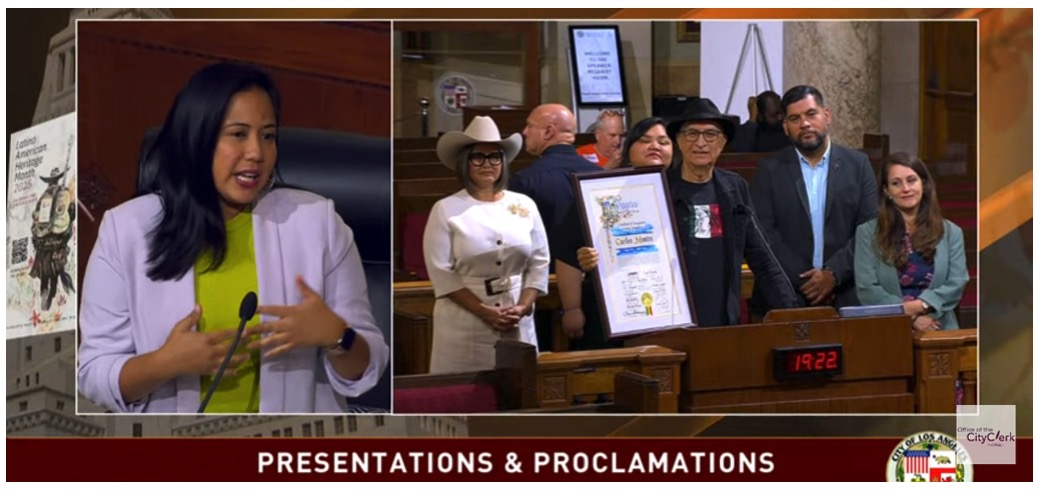
A motley crew of civil rights leaders... including Carlos Montes!
Tuesday, Sept. 16 — City Council (10 a.m.)
First up, Item 33 draws new “no sitting/lying/sleeping” zones in Council District 10—three Wilshire subway stations, a stretch of the E Line, parks, day-care centers, freeway areas, even a hospital campus. Imagine being told you can’t rest in the quad with no alternative offered; that’s the criticism here. The fix is simple: if you enforce at these hotspots, add bathrooms, storage, outreach, and real placements right there. Ask: “What’s the plan to actually help people, not just move them?”
Item 28 would cut parking-space minimums for new or changing buildings. That can lower costs—like getting more books without hiking school fees—but only if buses, bikes, and walking routes really work. Ask: “How will people get around without just circling for parking?”
There’s big-ticket stuff too: loans for the Department of Water and Power and a downtown deal at 700 S. Flower. It’s like borrowing for a fancy gym; you deserve to know the scoreboard. Ask: “Exactly how many jobs, affordable homes, or public benefits do we get?”
They’re also picking key leaders. A big one: Patrice Lattimore as City Clerk—the person who keeps records findable, which is how the public (you) holds power to account. "Hello, Patrice!"
Ask: “How will these appointments make the city fairer and more transparent?” And hovering over multiple items is the LA Alliance lawsuit on homelessness—basically the teacher checking the group project. Ask: “What’s the latest progress because of this lawsuit? Why are we paying these lawyer so much to fight a questionable fight?"
Tuesday, Sept. 16 — Budget & Finance Committee (2 p.m.)
The afternoon zooms in on money. The City wants to borrow almost $1 billion to upgrade the Convention Center for mega-events. That’s years of payments (by y'all) so show the math. Ask: “How does this help Angelenos, not just visitors?”
LAHSA—a troubled agency that runs homeless services—needs a $9.62 million short-term loan because promised funding arrives late. That’s like waiting for lunch money when you’re already hungry. Ask: “Why does the cash arrive so slowly, and what’s the fix?”
A Studio City project paid $71,914 in permit-related fees and now wants most of it back after canceling. The City proposes refunding $70,771 and keeping $1,142. Ask: Checking whether a certain council leader once lived on that street. Context matters.
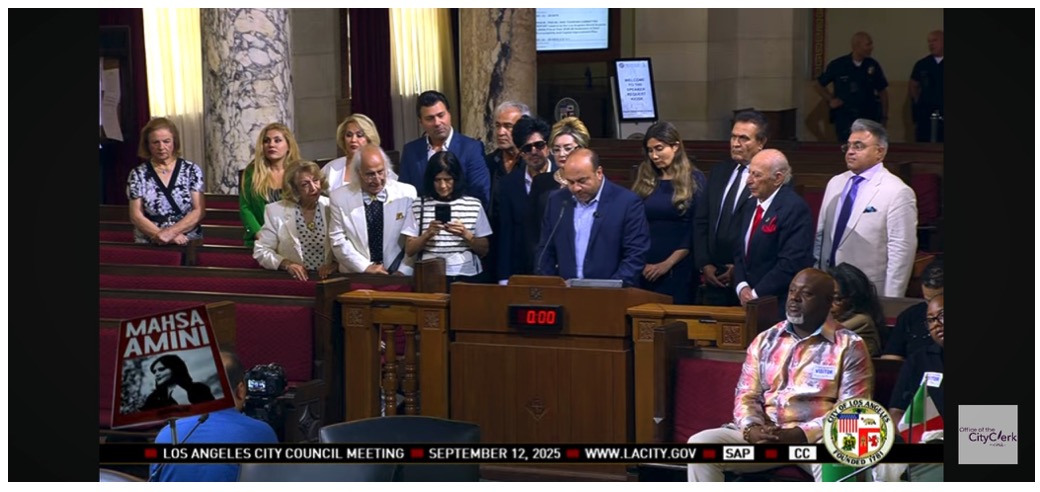
Katy Yaroslavsky (CD5) was not around for the late breaking Mahsa Amini recognition.
The City is also adding spending money on an expert witness for a lawsuit called VTS v. City. Lawsuits drain money that could fund parks or libraries. Ask: “How much have we spent so far, and does settling cost less than fighting?” Finally, a company named AECOM is in a business-tax dispute with the City. It’s handled in closed session, but the stakes are public: if one big contractor gets a break, others will want one too. Ask: “What’s the potential cost to the City, and what precedent would this set? Isn't AECOM the company that covered Garcetti's inauguration? Is up in everything...Haggerty?”
Bonus accountability note for Jonathan Groat, the bossy City Attorney: “Where is the status on my claims data? Please identify who has it and when I’ll see it.” cc - District Attorney Nathan Hochman, a great American*

We see you, Groat!
Wednesday, Sept. 17 — City Council (10 a.m.)
Day two is a mix of fixes and new rules. The sleeper hit is Item 16: making meeting audio actually usable. Think podcast-style access with time stamps that jump to each agenda item. But make it platform-neutral—keep YouTube, add a no-login RSS feed and direct MP3 downloads with captions and transcripts so everyone can follow along. Ask: “When will recordings be easy to find, hear, and download for free?”
Olympics planning shows up as a Sepulveda Basin website. Don’t make it a shiny poster—publish drafts, change logs, and timelines. Ask: “Will the site show real documents, not just highlights?”
New speed cameras under AB 645 could improve safety—or become ticket machines focused on the same neighborhoods. Ask: “What safeguards prevent unfair targeting or revenue chasing?”
Housing items move buildings into use for real homes and tweak homeless-service contracts. Score it like a game: the stat that matters is exits to permanent housing, not just beds. Ask: “How many people are getting real homes—and how fast?”
There are reports on water issues in Granada Hills and pollution controls at Atlas Iron & Metal. Plans need deadlines, not slogans. Ask: “What are the fixes and by when?”
Finally, they’ll fill key commission seats that decide what gets built, protected, or inspected in your neighborhood. Ask: “How will these decision-makers keep choices fair across the whole city?”
Why you should care
These meetings decide who gets help, where we invest, and how honest the process is. It’s your city. Watch online, send a short comment, or email your councilmember. A focused question at the right moment can move policy more than you think.
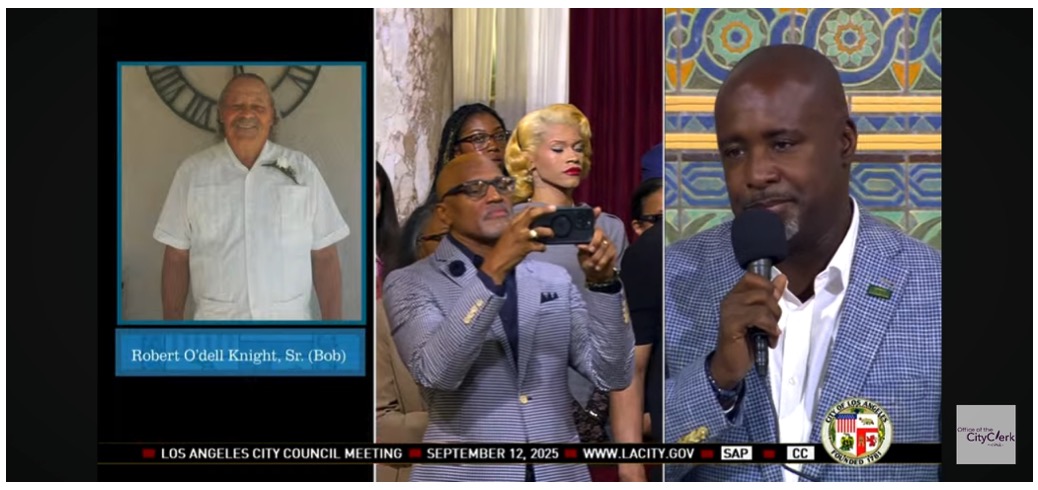
Fancy production values with elevating three shot!
Crudités & Civil Liberties
City Hall is on a speed run to look “mega-event ready.” According to LAist, Mayor Bass’s Executive Directive 14 orders the LAPD to cut its officer-hiring pipeline from an average of about 322 days to 180 days—a six-month sprint to restock the ranks before the 2026 World Cup and the 2028 Olympics. The same LAist reporting pegs the coming **security operation at roughly a billion dollars, a mix of overtime, mutual-aid agreements, surveillance toys and the usual gates and gadgets.
And because our leaders are racing to appear prepared, I’m merely trying to be helpful.
Studio City’s soon-to-sparkle Harvard-Westlake River Park—the $160 million Munger-nasium with three regulation courts, river views, and discreet perimeter walls—offers the perfect optional First Amendment Hospitality Zone. Sharp critics (moi) can skip the Valley Fever and desert corrals, choosing shaded grandstands, Wi-Fi, and crudités while staying within earshot of the billion-dollar spectacle.
Bonus: for former Press Club award winners and generous donors, there’s lap swimming before you grab the mic. Civil liberties with a side of backstroke—because if City Hall is going to fast-track cops and spend a fortune on “security,” the least we can do is protest in comfort and style.
Brentwood Status Index
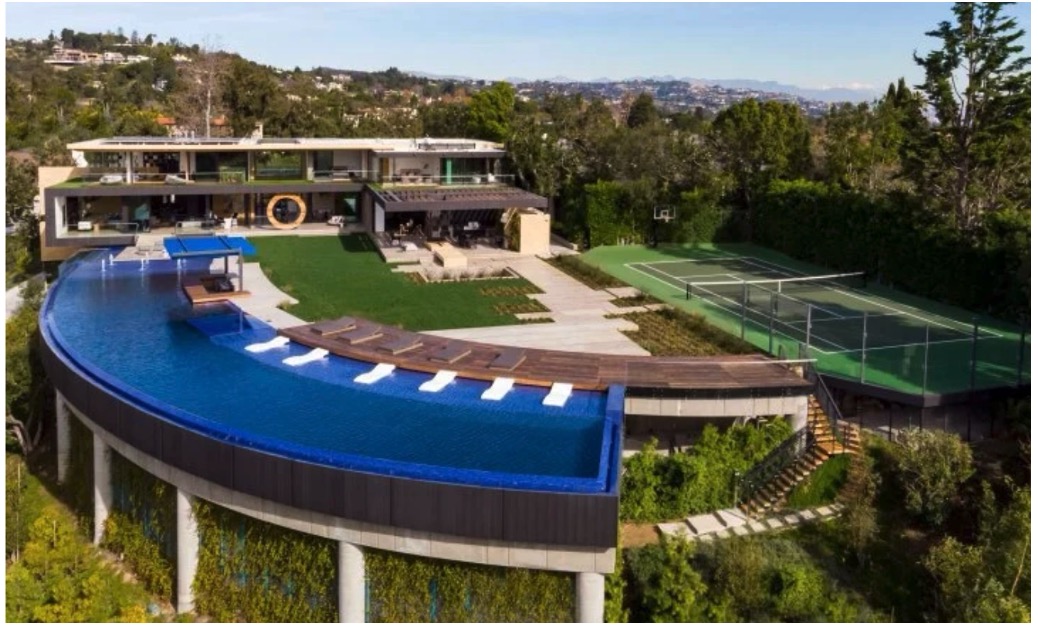
Infinity pools are zeitgeisty.
“Los Angeles pool builders couldn’t dig a hole fast enough” (Crosstown, Aug. 18, 2025). Welcome to the Brentwood Status Index, your sly guide to LA’s low-key elite, where status reeks of chlorine. Pools are the flex, running $80k–$150k, more for extra flair. Brentwood’s the art of looking effortless.
Socially, it’s who sees you and where you vanish. Private jet to the Hamptons? Third to a full pool. Desert Boss Weekend at La Quinta or Bighorn—villa, chef, $12k wine pull—quarter to half a pool. Santa Barbara “crash pad” with ocean views? Forty to a hundred pools. Malibu second home? Over a hundred pools, plus five yearly for wildfire insurance. Country clubs—Riviera, Bel-Air, Lakes—half to two pools a year for tennis, pickleball, and padel (“tennis with soul”).
Wellness is a cult. Cool shrink, no weekends, quarter pool a year. Tweakments for “lightly toasted” vibes? Quarter to full pool. Longevity stack—GLP-1, cold plunges, IV drips—half a pool yearly. Ortho for knees? Eighth to quarter pool per fix.
Cars yell status. Wagon Wars: Audi RS6 Avant, Mercedes E-All-Terrain, or Taycan Cross Turismo, one to one-and-a-half pools. SUVs? Range Rover, Cayenne Turbo, or Rivian R1S, three-quarters to one pool. G-Wagen’s one pool for “safety”; Cybertruck’s three-quarters for irony.
Kids are a flex war. Micro-schools with big donations? Two to five pools a year. Travel teams with coaches and nutritionists? Half to one pool per kid. SAT tutors double as mindfulness gurus.
Home’s status with a side of dread. Carrara countertops (third to full pool) etch under lemon juice. Outdoor kitchen with pizza oven? Half a pool. Art print and a dying fiddle leaf? Quarter pool. Eucalyptus diffusers? Eighth pool for hotel-lobby vibes.
Invisible flexes: Sommelier of Procurement for rare limestone or chandeliers, half a pool per quest. Gala committee cardio? Half a pool per event. Heli/jet-share? One to two pools a year. Wine brag about a $3,758 bottle for your Reklaw address? Quarter pool for the tale.
Tally your pools to know your rank. “Modest” flex—RS6, micro-school, tweakments, golf—five pools a year. Big dogs with Malibu pads and jet shares? One-fifty pools and up. Spot your neighbor’s flex by their driveway or gala chatter. Call the G-Wagen “practical,” the pool “wellness,” and the Hamptons a “reset.” Loud flex on your block? Spill it—what’s their pool count?
Mitch Kamin in the House
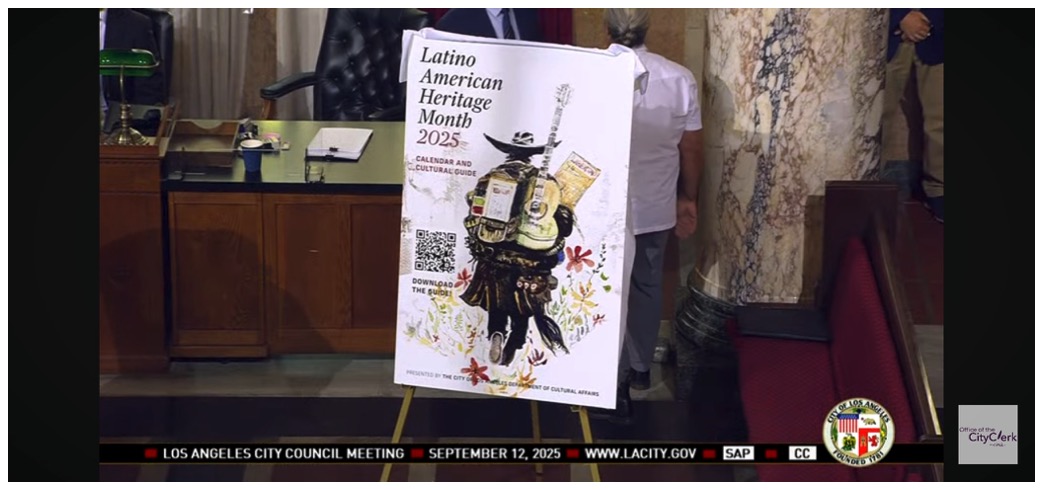
Cultures of all kinds flourish in city hall... including Corruption.
OMG, I went digging and now I’m irritated all over again. First, the Lucas Museum still plans to charge admission when it opens—even after millions in public support. Los Angeles built its reputation on free museums, and this feels like a paywall for culture.
Second, the long-running Covington & Burling secrecy over public-law invoices never really went away. County cases, City cases—it’s the same dance: sky-high outside-counsel bills tucked behind privilege claims until the public gives up.
And now the Venn diagram closes: Mayor Bass just named Mitch Kamin her new chief of staff, starting September 22. He’s a former Covington partner and until recently a top exec at the Lucas Museum. Perfect overlap—museum fees and billing opacity meet City Hall’s top office.
Welcome to the job, Mr. Kamin. It’s a thankless one. We all hope you bring the “status-quo disrupter” energy the mayor promised, not the habits of secrecy and double-charging that frustrate Angelenos.
So, here’s the ask: let’s keep museum access free for residents, and let’s finally publish every penny of outside-counsel billing without lawsuits or stonewalling. Sunlight, not paywalls.
(Eric Preven is a Studio City-based television writer-producer, award-winning journalist, and longtime community activist. He is known for his sharp commentary on transparency and accountability in local government. Eric successfully brought and won two landmark open government cases in California, reinforcing the public’s right to know. A regular contributor to CityWatch, he combines investigative insight with grassroots advocacy to shine a light on civic issues across Los Angeles.)








